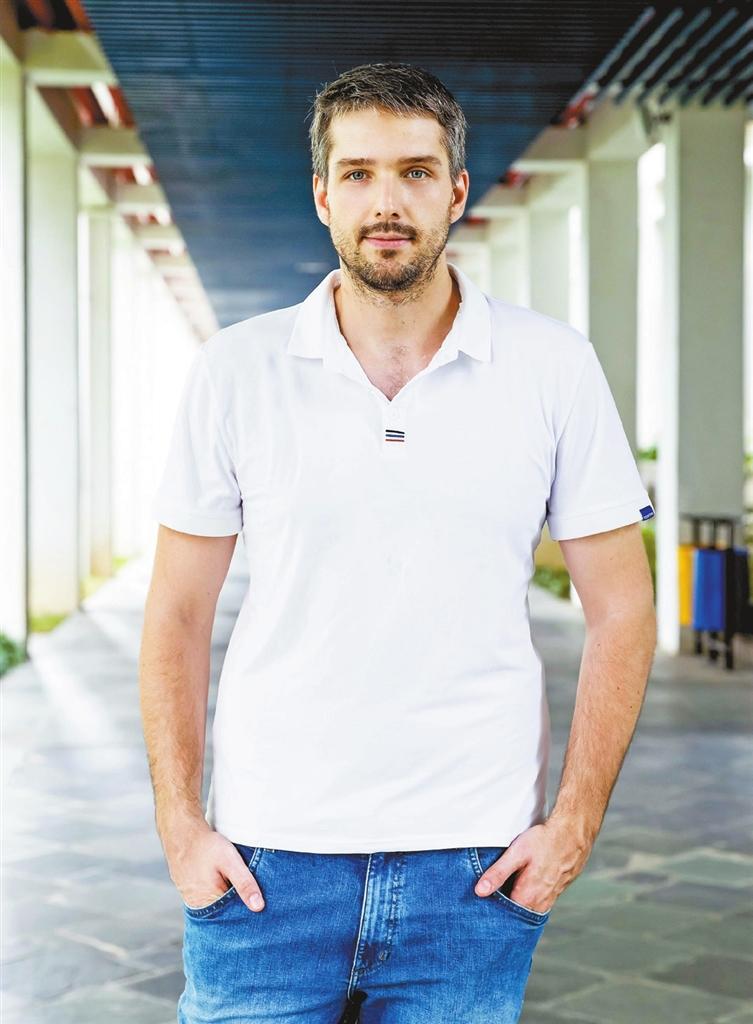

Yang Mei yangmei_szdaily@163.com SPEAKING fluent Mandarin, Tymoteusz Świstek might leave you with the impression that he has spent many years learning and using Chinese in China. However, the truth is that the Polish man’s story with China began in his home country in 2014, when he was admitted into a three-year Confucius China Studies Program at the University of of Gdańsk after finishing his bachelor’s degree in computer science. During the program, he had a chance to study for one year at the China Youth University of Political Studies in Beijing in 2015. Świstek also speaks English, Japanese and French. “I’ve always been interested in learning different languages and cultures, particularly Asian cultures. Asian languages intrigue me and I love the shapes of Chinese characters,” Świstek explained. This year, the 32-year-old graduated from the Tsinghua Shenzhen International Graduate School (Tsinghua SIGS) with a master’s degree in electronic information. Now the young man, along with his two Chinese classmates, founded their own company Visioneers in Nanshan Intelligent Park in Nanshan District in January. According to Świstek, the company’s chief technology officer (CTO), Visioneers focuses on machine vision technology. The company will work to increase the effectiveness and safety of lithium-ion batteries in the short term and expand to horizontal areas in new energy in the long term. Early engagement with China Language can be a powerful tool that opens up possibilities for people, which proves to be true in Świstek’s case. “Language is not only my passion, but also a unique advantage for my career,” he said. Thanks to his proficiency in the Chinese language and his prior learning experience in Beijing, Świstek successfully landed a job in Poland in 2017. He joined a software company with business operations in China. Świstek assumed various roles, offering technical support to Chinese customers, communicating with distributors, taking business trips to China, running training sessions, and performing feasibility studies. In the process, he has improved his Chinese and established closer connections to the machine vision industry in China. Świstek recalled that in 2019 alone, he was on business trips to Asian countries for approximately 200 days, with a significant portion of that time, or around 180 days, dedicated to China. In 2017, he came to Shenzhen for the very first time, which struck him as a “vacation destination” due to its pleasant climate. Studying at Tsinghua SIGS During one of his business trips in Shenzhen, Świstek met his future adviser Prof. Wang Haoqian. In 2020, Świstek enrolled at Tsinghua SIGS as an electronic information major concentrating on artificial intelligence. He joined Wang’s Future Media Lab as its first international student. In the lab, he completed an independent research project related to machine vision, specifically ways to optimize using algorithms and machines to find defects in lithium-ion electrodes. “It was a great honor to become a member of Tsing-hua SIGS, and my hard work in the Chinese language finally paid off,” he said. The pandemic brought challenges to Świstek’s academic career. For two and half years, he was physically outside of China, but with the support of his adviser and classmates, he was able to continue to work on his research and establish relationships with the team. Earlier this year, Świstek returned to the SIGS campus, where he was able to delve deeper into his research. Initial BRI experience This year marks the 10th anniversary of the China-proposed Belt and Road Initiative (BRI). Poland joined BRI in 2015. In the same year, Świstek represented the China Youth University of Political Studies to make a tour to Chinese provinces and cities along the ancient Silk Road, including Xi’an in Shaanxi Province, Yinchuan in the Ningxia Hui Autonomous Region, and Qinghai Province. “That was my first time to actually travel in China. I visited museums and learned more about Chinese history. I was amazed by the terra cotta warriors,” he recalled. Świstek added that during the trip he had a deeper understanding of the role of the ancient Silk Road, which helps him better understand the BRI. “The ancient Silk Road used to be an important trade route connecting Asia and Europe. One of BRI’s goals is to revitalize the ancient Silk Road trade route, which is a good move to guide different countries for more communication and greater economic development,” Świstek said. This July, the Polish S14 highway, a BRI cooperation project built by Power China Municipal Corp., opened to traffic. It is the first highway construction project signed by a Chinese company in Poland in the past 10 years. The project adopts multiple measures to protect animals and plants, such as installing reptile fences, classifying and protecting on-site trees, and hiring an environmental supervision team to regularly issue monitoring reports. Lodz, where the road is located, became the first city in Poland to have a complete ring expressway, which will consolidate its position as a logistics and transportation hub as well as an important transit point for China-Europe logistics. | 
